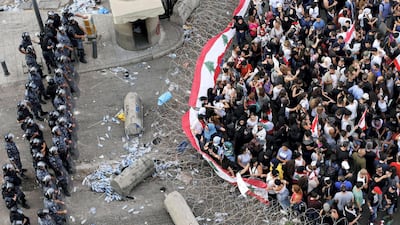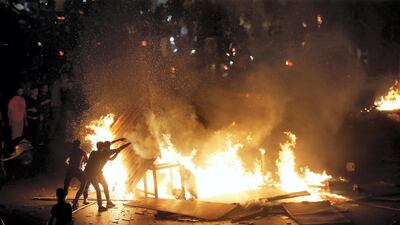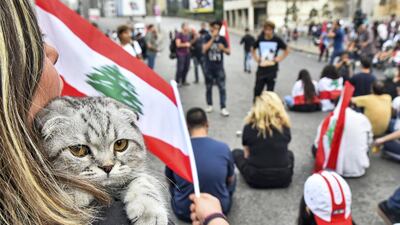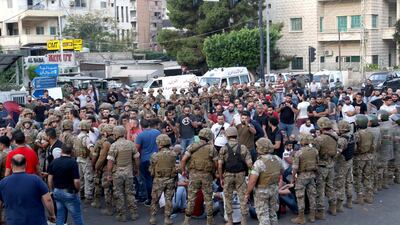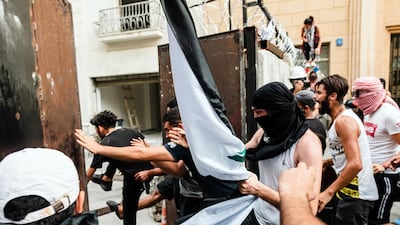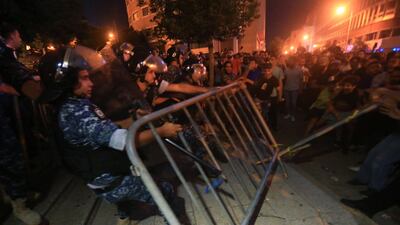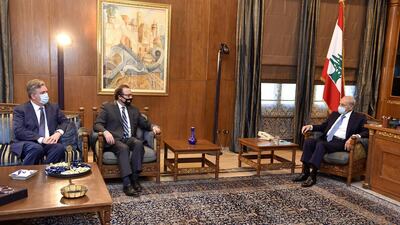Lebanese took to the streets of Beirut, Tripoli and other cities en masse one year ago to reject a political model that treated them as clients reliant on handouts from the country’s denominational leaders.
They were crushed in stages, with the acquiescence of most of the political class, and nature, in the form of the coronavirus, putting them at a disadvantage.
Violence by the authorities and allied gunmen, as well as political scheming by the elite, made the protests fizzle out.
But some political and social fundamentals may have transformed in Lebanon, separating October 2019 and its aftermath from every movement demanding change in the country since the 2005 assassination of statesman Rafik Hariri in Beirut.
Entrenched sectarian differences faded among demonstrators demanding the removal of every senior member of the political class. Women marched in large numbers at peaceful rallies and led demonstrations.
Hope rose for an end of an oligarchical system many see as having bedevilled a resilient nation whose economy collapsed after rising from civil war, partly due to contradictions in the peace arrangements that ended the conflict.
Citizens from all walks of life had had enough of corruption and creeping repression. Arbitrary arrests were increasing and disregard for rule of law spread, although Lebanon traditionally has been among the most open societies in the Middle East and produced some its most distinguished legal scholars.
In the three decades since the end of the civil war, daily life has been disrupted by massive electricity shortages. Private generator networks thrived on the misery. Tens of billions of dollars spent since 1990 on the state-owned Electricite du Liban would have comfortably paid for a whole new electricity grid for the country’s 5.5 million inhabitants.
Another absent response from the state, this time to forest fires in Mount Lebanon and the Chouf Mountains, sparked the demonstrations on October 17, 2019.
The fires were ravaging what was left of Lebanon’s natural beauty, which has been at the heart of the nation’s celebrated literature and arts.
When Lebanon was the playground of the Middle East and a destination for the jet set in the 1960s and 1970s, the world’s who’s who marvelled at its deep green gorges and tree covered mountains straddling a coastline dotted with beaches with names similar to the French Riviera.
Greedy developers destroyed much of those irreplaceable assets since the civil war, often in partnership with the ruling elite.
As the anniversary of the uprising approached, forest fires were raging again in parts of Lebanon, with the same nonchalant response by the state, and former prime minister Saad Hariri is on the verge of forming a new government.
Mr Hariri, the son of Rafik Hariri, was the only senior politician to resign in response to the popular pressure. But he rejoined an old guard mostly impervious to the uproar at home and pressure by European countries, in particular France, for reform.
In the 12-month interval, the Lebanese economy and currency collapsed. The financial system melted as the markets, and regular depositors, lost confidence in the government’s ability to repay its debt, which mostly went to covering state salaries and the non-existent electric supply.
The security forces countered the demonstrations with the acquiescence of Hezbollah, the only militia from the civil war officially allowed to hold arms. Supporters of Amal, a smaller Shiite group allied with Hezbollah and headed by parliament speaker Nabih Berri, actively took part in the violent suppression.
Human Rights Watch said parliament guards were among security forces who used "excessive and at times lethal force against mostly peaceful protesters in downtown Beirut on August 8, 2020, causing hundreds of injuries”.
The demonstration near parliament occurred after an explosion on August 4 of ammonium nitrate stored at the Beirut port that killed more than 200 people, exposing stratospheric levels of corruption and mismanagement.
Shiites traditionally supportive of the Hezbollah initially marched in the streets along with the rest of the demonstrators, until Shiite gunmen intervened, in particular to clear the streets of their coreligionists.
Lebanese political commentator Abdulwahab Badrakhan said Hezbollah cowed its Shiite constituency, making it clear that it regards its alliance with Michel Aoun, the Maronite Christian president and the oldest hate figure for the protest movement, as unbreakable.
“Hezbollah forbade anyone from jumping off the sinking ship,” Mr Badrakhan said from London.
The CIA World Factbook shows Shiites making up 30 .5 per cent of Lebanon’s population. Sunnis comprise 30.6 per cent and Christians 33.7 per cent while the Druze are 5.2 per cent.
Georges Ghanem, co-ordinator for Rally for the Revolution, said that although violence largely cleared the demonstrators from the street, an unshakeable, denomination-based belief in the political leaders as supreme caregivers has been broken.
“The equation of violence versus non-violence has not been to our advantage, but a revolutionary civil society has been born and the era of impunity is over,” said Mr Ghanem, who is a professor of medicine in Beirut.
The Rally for the Revolution, known by its Arabic acronym TMT, comprises of lawyers, academics, business people and other professionals working on unifying the protest movement.
Members of the organisation met two weeks ago with the foreign affairs committee the French parliament to discuss a path for a civilian alternative to the existing oligarchy.
French President Emanuel Macron visited Beirut two days after the port explosion, and again in September, presenting politicians in Beirut with a reform plan that read to many observers as a laundry list. The Lebanese political class mostly responded with ambivalence.
In leaks to Lebanese media, former foreign minister Gibran Bassil told Mr Macron that boat people would be heading to Europe if France lets Lebanon sink.
Mr Bassil is the most powerful Christian politician in Lebanon and a main ally of the Iran-backed Hezbollah.
His warning was designed to strike a raw nerve in a continent reeling from the influx of Arab and African refugees five years ago.
It also showed the ability of an entrenched elite to play political hardball, even with a figure as crucial as Mr Macron if Lebanon is ever to receive a financial lifeline.
Malte Gaier, head of the Konrad Adenauer Foundation in Beirut, said “there is still the tendency among Lebanese political leaders to overestimate the importance of Lebanon”, despite the high-profile diplomacy of Mr Macron.
Mr Gaier said “from a German and a European point of view it could become increasing problematic” to support a government whose security forces use violence against civilians, pointing out that most emergency aid from Europe after the port explosion went to grass-root organisations.
The politicians have made it clear that they are playing the long game, waiting for France and other European countries to budge and deal with them again, even if the economy and society further deteriorate.
Former Lebanese parliamentarian Ghassan Moukheiber said although the politicians the uprising wants removed have coalesced, they face limits in their strategy to resist the pressure.
Mr Moukheiber, who has a law degree from Harvard, painted a possible doomsday scenario.
He told The National that with "the breakdown of everything at the same time" a plethora of armed groups could form, and that although Hezbollah has the most fire power, many Lebanese have individual weapons.
In this case, Hezbollah would be “on top of the magma of armed groups” amid a chaos “beyond the capacity of anyone to know the result”.
But the veteran lawyer also sees possibility for positive political developments, mainly consisting of a new government implementing gradual reforms and representatives of the protest movement scoring significant wins in the next parliamentary elections, due in 2022.
“They will have to get better organised and play the technical game of elections. The real impact of the uprising will be if alternative voices are heard within parliament,” Mr Moukheiber said.
Mr Moukheiber participated in civilian efforts to safeguard Lebanon’s environment after the civil war, undermined by a political class he sees as “having reached the extreme limits of its survival”.
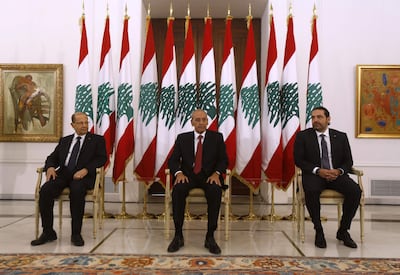
Throughout history, invaders were so awestruck by the intense beauty of the Lebanese landscape that they left inscriptions commemorating their feat on a rocky bridgehead at the mouth of Nahr Al Kalb (Dog River) north of Beirut.
The stelae of Nahr Al Kalb bear the names of ancient Egyptian, Assyrian, Babylonian and later Mamlouk and Western commanders. Nondescript modern buildings encroach on the site, and part of the rubbish-strewn hill was blown away to expand the “highway of death”, the main road along the sea linking Beirut to the north.
There are no plaques by those who conquered Lebanon from within.


